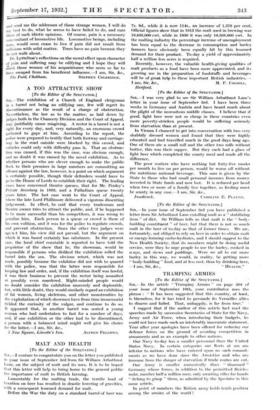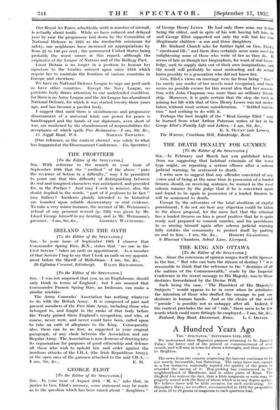TRAMPING ARMIES
[To the Editor of the SPECTATOR.] SIR,—In the article " Tramping Armies " on page 304 of your issue of September 10th, your contributor uses the phrase : It has been suggested that this country, at least,' is blameless, 'for it haS tried 'to persuade its Versailles allies to disarm and failed. That, unhappily, is far from true." : I suggest that if the author of this article had read the speeches made by successive Secretaries of State for the Navy, Army and Air Force, when introducing their budgets, he could not have made such an intolerably inaccurate statement. Year after year apologies have been offered for reducing our defence forces on the ground of avoiding competition in armaments and as an example to other nations.
Our Navy to-day has a smaller personnel than the United States Navy. In certain categories our fleets at sea are inferior to nations who have entered upon no such commit- ments as we have done since the Armistice and who are immune from the danger of starvation if trade routes are cut: Our Army is smaller numerically than " disarmed " Germany whose forces, in addition to the permitted Reichs- wehr, number half a million men, only awaiting rifles for hands " itching to grasp " them, as admitted by the Spectator in this same article.
In point of numbers the British army holds tenth position among the armies of the world Our Royal Air Force, admittedly sixth in number of aircraft, is actually about tenth. While we have reduced and delayed year by year the programme laid down by the Committee of National Defence in 1923 as the irreducible minimum for safety, our neighbours have increased air appropriations by from 25 to 140 per cent., the unmenaced United States being probably the worst sinner in this regard, although the originator of the League of Nations and of the Kellogg Pact.
Great Britain is no longer in a position to honour her signature to the treaties entered upon since 1918 which require her to maintain the frontiers of various countries in Europe and elsewhere.
We have no National Defence League to urge our peril such as have other countries. Except the Navy League, no patriotic body draws attention to our undefended condition, for there is no Army League and the Air League has abandoned National Defence, for which it was started twenty-three years ago, and has become a pacifist body.
I suggest that until there is simultaneous and progressive disarmament of a universal kind, our power for peace is handicapped and the hands of our diplomats, even short of war, are weakened by the abandonment of responsibilities the acceptance of which spells Pax Britannica.—I am, Sir, &c., 15 Argyll Road, W.8. NORMAN THWAITES. [Our reference, as the context showed, was solely to what has happened at the Disarmament Conference.—En. Spectator.]































 Previous page
Previous page